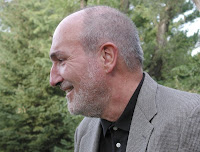3.03.2010
James P. Danky on the Underground Press (Case Study No. 9)
We first heard of Jim Danky in the early 1980s while undergraduates at the University of Wisconsin-Madison. Everyone we knew was making films, publishing zines with names like White Noise, Reagan Death and Catholic Guilt, playing in bands at Merlyn's or staging performance art pieces on the State Street Mall. As a librarian at the Wisconsin State Historical Society, he collected DIY photocopied band flyers and zines produced by undergrads like ourselves. We felt validated each time "the guy from the Historical Society" (as Catholic Guilt editor Danny used to refer to him) acquired one of our publications. His collecting/archiving included a range of periodicals ranging from alternative newspapers, underground comix to zines and more. In 1974, he published his first book, Undergrounds: A Union List of Alternative Periodicals in Libraries of the United States and Canada. He subsequently authored and edited numerous books on print culture with titles such as: Women in Print: American Women in the 19th and 20th Century published by University of Wisconsin Press and Reading, Writing and Resistance: African-American Print Culture and The Oppositional Press: A History of the Book in America published by Cambridge University and many more. He is on the faculty of the School of Journalism and Mass Communication at the University of Wisconsin-Madison, where he also founded and directed the Center for the History of Print Culture in Modern America. Underground Classics: The Transformation of Comics into Comix, his recent book, provides the first serious survey of underground comix as art, turning the spotlight on these highly influential and largely under appreciated artists. It accompanied a traveling exhibition of the same name that showed at the Chazen Museum of Art in Madison, Wisconsin in summer of 2009. Jim might be considered a "radical librarian" based on the scholarly attention he has paid to periodicals that fall under the radar of most institutions. He makes us pay attention to the things we have been conditioned to ignore.
Subscribe to:
Post Comments (Atom)

No comments:
Post a Comment